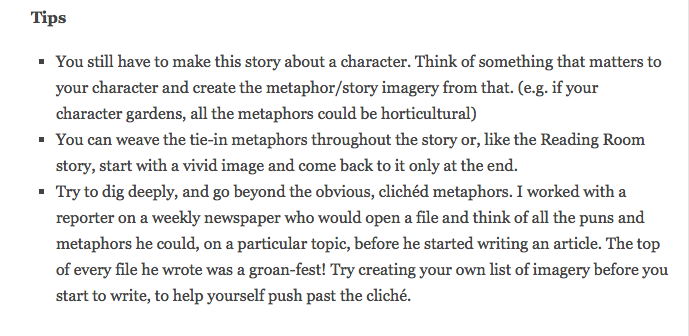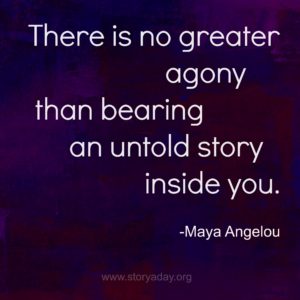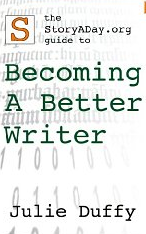I talk a lot about writing prompts and Story Sparks around here. They are your secret weapons for getting through a month of extreme short story writing!
What is a Story Spark?
It’s a term I coined for something that is less than a story idea and certainly not an outline, but something that you notice while walking the world: things that make you go ‘hmmm’, if you will.
Story sparks are details about the world that you can use either to spark or add richness to a story. They can be:
- Fragments of conversation: become a dedicated eavesdropper, if you aren’t all ready.
- Details from the world around you: the exact color and shape of a dogwood flower in April; a snippet of conversation overhead, out of context; the rhythm of a 14 year old girl’s speech,
- Big Ideas that occur to you randomly: the ‘where are all these people going?’ that pops into your head while you’re sitting in traffic; what if my baby had been born with wings? why do so many of us believe in a deity?.
- Memories: spend some time going through old memories and pulling out interesting characters, conflicts, fears, hopes, joys. Gather some of them as Story Sparks.
Some of these, with a little interrogation and development could be come a story or a series of stories, but for now they are simply ideas that flit across your brain.You needn’t have any clue what kind of story they’ll fit into or how you might use them.
Capture them.
Save them for later.
How To Harness The Power Of Story Sparks
To feel the power of Story Sparks you must gather them continuously.
Set yourself a goal of gathering three story sparks every day and you will find yourself seeing the world in a different way (a writer’s way).Aim to have 15 at the end of each week, but don’t collect them all on one day.
By getting into the habit of observing the world around you and capturing story sparks daily, you are training your brain to see the world through an artist’s filter. This will help immeasurably when you sit down to write.
Writing Prompts Are Not Story Sparks
(At least not the way I do them here at StoryADay)
I provide an optional writing prompt for every day in May (If you want to support the challenge and give me a pat on the back, you can grab a copy of last year’s prompts here or stay tuned for the release of this year’s prompt ebook)
My writing prompts are intentionally vague.
I don’t know if you prefer comedy or tragedy, sci fi or contemporary romance. I don’t know if you’re a woman or a man or a child or a nonagenarian. So I keep the prompts vague. Here’s an example:
 I’m not giving you a topic or a character or telling you where to set your story. I’m giving you a way into a story.
I’m not giving you a topic or a character or telling you where to set your story. I’m giving you a way into a story.
This is the perfect time to start digging around in your Story Sparks notebook/file and see what might fit with this prompt. Choose a Spark that leaps out at you today, in today’s mood, with today’s time restrictions and today’s challenges.
I also give you tips everyday. They are intended to help you drill down further into the prompt, and figure out how you can make it work for you.

Here’s another example:

Notice, I don’t tell you what kind of character to choose or where to place him/her. That’s up to you. Dig into your Story Sparks and see if you can find inspiration for a character who might have these qualities.
Here are the tips I provided for this prompt:

Again, you’ll need to bring your own ideas to this exercise. It’s not a scenario that dictates any details about the story, but rather a prompt; a way into finding a character and a story that matter to you.
And that is the only way to write a story that matters to readers.
So go now and start collecting Story Sparks: 3 a day. You’ll thank me, around May 14, when the creative well is not only dry but cracking and threatening to implode.
The Writing Prompt eBook – Details!
You can get all the prompts from StoryADay 2016 in this ebook.
Behind The Curtain
Why Make It Available Exclusively Through Amazon?
A few reasons: One is that it keeps things simple for me. There’s a lot going on around here in April/May and setting up an ebook with three or four different vendors is a LOT of work. I like Amazon. You can get it for Kindle or use their browser-based Kindle app at no charge.
Another is that Amazon is a big kahuna. If lots of people buy the ebook from Amazon (especially if you all buy it on opening day) the ebook shoots up the charts and gets more exposure, and more people hear about StoryADay, which makes the community more buzzy and you more likely to find a writing friend you lurve. (See? It’s all about you).
Thirdly (and this one is less about you), Amazon pays well. If I use their Kindle Direct Publishing and make the book exclusive to them, I get 70% of the list price in royalties in every international market they cover. This money all goes into the running of StoryADay (so actually, it is about you!).
Speaking of money: I intend to keep the StoryADay May challenge free forever. But running it is not. In addition to the hundreds of hours I spend working on this every year, I have hosting and domain-registration costs, support for the times when the web coding gets too much for me, the Mailchimp email list hosting (we’re such a big tribe now that we’ve outgrown Mailchimp’s free service); hosting fees for the service I use to sell workshops and ebooks, and on and on the costs go. I’m fairly frugal but the costs run over $1000 a year.
If everyone on the mailing list bought a copy of the ebook on release day I would cover my costs and have a bit left over to make the site prettier and more functional next year.
That won’t happen, but every little bit helps. If you do feel like kicking in a few more dollars of support, don’t forget about the StoryADay Shop, which is full of books, writing workshops and the world-famous StoryADay I, WRITER Course – six weeks, ten stories, one new writing life).
So there’s my Amanda-Palmer-inspired begging bowl. Want to support StoryADay? Buy an ebook, course or workshop. Or, if money is tight, spread the word to your writer friends. Get them involved in StoryADay. That’s as valuable to me as a monetary contribution! And more fun.
OK, this was a long post today. Sorry about that, and thanks to anyone who’s still here at the end of it!
Phew! On with the challenge!




